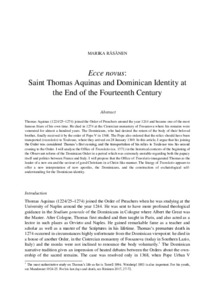Ecce novus: Saint Thomas Aquinas and Dominican Identity at the End of the Fourteenth Century
Marika Räsänen
https://urn.fi/URN:NBN:fi-fe2021042827655
Tiivistelmä
Thomas Aquinas (1224/25-1274) joined the Order of Preachers around the year 1244 and became one of the most famous friars of this own time. He died in 1274 at the Cistercian monastery of Fossanova where his remains were venerated for almost a hundred years. The Dominicans, who had desired the return of the body of their beloved brother, finally received it by the order of Pope V in 1368. The Pope also ordered that the relics should have been transported (translatio) to Toulouse, where they arrived on 28 January 1369. In this article, I argue that his joining the Order was considered Thomas's first coming, and the transportation of his relics to Toulouse was his second coming to the Order. I will analyse the Office of Translatio (ca.1371) in the historical contexts of the beginning of the Observant reform of the Dominican Order in a period which was extremely unstable regarding both the papacy itself and politics between France and Italy. I will propose that the Office of Translatio inaugurated Thomas as the leader of a new era and the saviour of good Christians in a Christ-like manner. The liturgy of Translatio appears to offer a new interpretation of new apostles, the Dominicans, and the construction of eschatological self-understanding for the Dominican identity.
Kokoelmat
- Rinnakkaistallenteet [19248]
